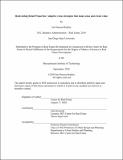Reinventing retail properties : adaptive reuse strategies that make sense and create value
Author(s)
Bradley, Ian Duncan.
Download1227100377-MIT.pdf (10.21Mb)
Other Contributors
Massachusetts Institute of Technology. Center for Real Estate. Program in Real Estate Development.
Advisor
John Kennedy.
Terms of use
Metadata
Show full item recordAbstract
There is currently more retail space per capita in the United States than in any other country, especially suburban mall space. Most American malls built throughout the twentieth century were designed to satisfy the American consumer's reliance upon the automobile and were subsequently strategically placed adjacent to major transportation arteries just on the outskirts of then existing communities. At the time of their construction, this was considered an economical strategy, as large swaths of land on the edge of town could be purchased at a significant discount when compared to land with closer proximity to increased population density; however, changes in consumer preference, along with population growth and now COVID-19, have all contributed to the continued downfall of the suburban mall. How will these massive centers, now situated in prime locations, be able to reinvent themselves and add value to the community if the community sees no value in their present use? This thesis seeks to examine this question through a case study analysis of the adaptive reuse of Highland Mall in Austin, TX. Through an intricate public-private partnership agreement, 1.2 million square feet of dying retail was able to be master planned into a thriving mixed-use development. Research material is derived from existing writings and personal interviews with relevant stakeholders. The conclusion this work leads to is that public-private partnerships provide a solution to the capital intensive process of reinventing retail properties.
Description
Thesis: S.M. in Real Estate Development, Massachusetts Institute of Technology, Program in Real Estate Development in conjunction with the Center for Real Estate, September, 2020 Cataloged from student-submitted PDF of thesis. Includes bibliographical references (pages 30-31).
Date issued
2020Department
Massachusetts Institute of Technology. Center for Real EstatePublisher
Massachusetts Institute of Technology
Keywords
Center for Real Estate. Program in Real Estate Development.